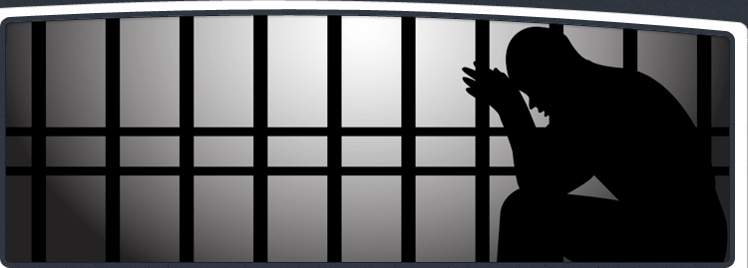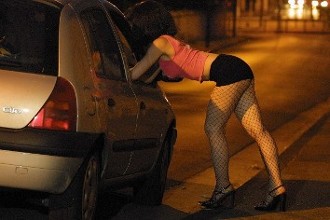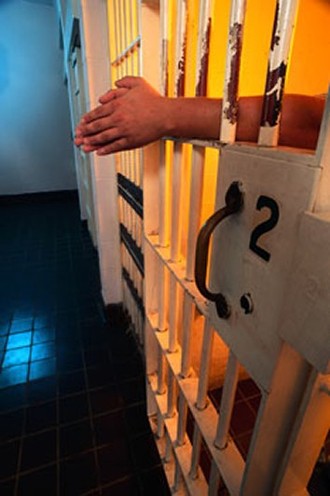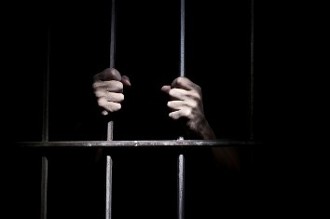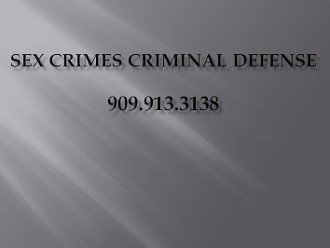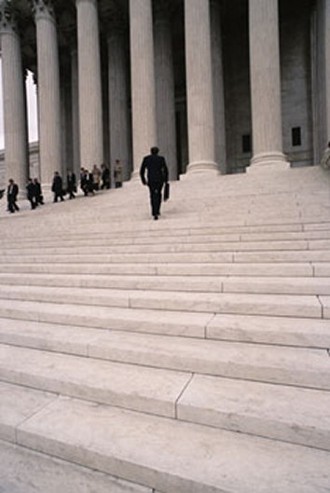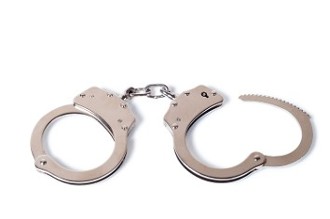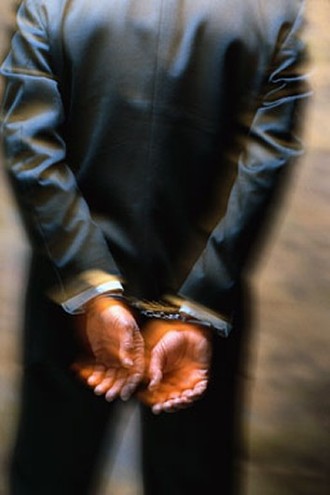| California Prostitution Laws & Defense
California Penal Codes 647(b), 653.22(a), & 315
The are many laws in California that criminalize conduct that amounts to prostitution. However, the most common laws on the crimes of prostitution are found under the following California penal code sections:
PC 647(b), prostitution;
PC 653.22(a) loitering for the purpose of prostitution, and
PC 315 Keeping a house of prostitution.
(For other types of California prostitution criminal charges see below at the end of this article).
The definition of prostitution is defined at California Penal Code section 647(b) as "soliciting, agreeing to engage in, or actually engaging in, any lewd act between persons for money or other consideration."
Loitering for the purpose of prostitution charged under PC 653.22(a) is charged where the district believes he or she can prove beyond a reasonable doubt that the defendant had the intent to solicit a prostitute because of his or her behavior such as driving around street prostitutes and loitering in the area of prostitution activities.
Keeping a house of prostitution charged under PC 315 is charged where the district attorney believes that he or she can prove that the defendant intended to keep prostitutes in a house, hotel, shop (massage parlor), etc.
A "lewd act," as that term is used in PC 647(b), means touching the genitals, buttocks, or female breast of either the prostitute or customer with some part of the other person's body for the purpose of sexual arousal or gratification of either person.
Prostitution crimes do not require that "Money or other consideration" be made directly to the person providing sexual favors. In fact, a promise to give anything of value, even if the value is to be given in the future, is sufficient "consideration" as that term is used in PC 647(b).
For the crime of "soliciting a prostitute," also charged as PC 647(b), (requesting a prostitute, or simply "Solicitation"), the prosecutors must prove that the defendant requested that another person engage in an act of prostitution, and that the defendant intended to engage in an act of prostitution with the other person, and the other person received the communication containing the request.
In addition, to prove the crime of prostitution under PC 647(b), the defendant must do something more than just agree to engage in prostitution. The defendant must do some act in furtherance of the agreement to be convicted (Examples: Getting into a car with a prostitute after agreeing to engage in prostitution, driving to a house of prostitution after agreeing to engage in prostitution, exchanging money after agreeing to engage in prostitution, etc.). Words alone may be sufficient to prove the act in furtherance of the agreement to commit prostitution (Example: Instructing the prostitute to take off his or her clothes after agreeing to engage in prostitution).
California prostitution under PC 647(b) is a "specific intent" crime which means that the defendant had to actually intend to solicit or engage in prostitution in order to be convicted. Rarely, does the defendant admit that he or she has intentionally solicited, or engaged in, prostitution. Therefore, the evidence of the defendant's solicitation, or intent to engage in, prostitution is usually proved by circumstantial evidence.
Circumstantial evidence of the Defendant's Intent to commit prostitution, or to solicit prostitution. may be shown by a person acting in a manner and under circumstances that demonstrate the intent to induce, entice, or solicit prostitution or to procure someone else to commit prostitution. For example: repeatedly stopping or attempted to stop vehicles by hailing, waving, or gesturing, or engaging or attempting to engage drivers or passengers in conversation, in a way that indicated the solicitation of prostitution, circling an area in a vehicle and repeatedly beckoning to, contacting, or attempted to contact or stop pedestrians or other motorists in a way that indicated the solicitation of prostitution, and the defendant's history of prostitution, may all be considered in demonstrating the defendant's intent to solicit or engage in prostitution.
Punishment for Prostitution under PC 647(b)), 653.22(a), and 315.
Violations of PC 647(b), 653.22(a), and 315, are considered misdemeanors. For a first offense conviction of prostitution the defendant faces up to 180 days in jail. (See below for additional punishments aside from jail)
It is sometimes possible to change the sentencing or the criminal charge itself, or both, to allow for a possible no-time, no-prostitution conviction sentence. It is also sometimes possible to serve any jail commitment as work release or electronic monitoring.
If a defendant has one prior conviction of prostitution he or she must receive a county jail sentence of not less than 45 days for a second conviction of prostitution under PC 647(b), which must be fully served.
If the defendant has two or more prior convictions, the minimum sentence, which also must be fully served upon a third conviction for prostitution under PC 647(b), is 90 days in the county jail. The prior conviction must be charged in the accusatory pleading and found true by the jury, or admitted, by the defendant. (P.C. 647(b)).
Enhanced Punishments for Prostitution (California Penal Code 647(b)):
Prior conviction and positive blood test for AIDS: Violations of the California prostitution statue is a felony if (a) the defendant has a prior conviction for violation of certain sex offenses listed in P.C. 1202.1 or 1202.6. The prior sex offense conviction and positive blood test results must be charged in the accusatory pleading and found true by the jury, or admitted by the defendant in order to be found guilty of the enhanced punishment.
Prostitution committed by use of an automobile within a 1,000 feet of a private residence: The court, in addition to imposing any other punishment, may suspend the defendant's driver's license for a period not to exceed 30 days, or may order the defendant's driving privilege restricted to necessary travel for not more than 6 months. If driving is necessary to employment, the court may also allow the defendant to drive within the scope of employment.
In addition to the punishment described above, if the defendant is convicted of prostitution under PC 647(b), he or she faces fines, probation, possible professional licensing restrictions or revocations, possible immigration consequences, possible asset forfeiture, and possible driving license restrictions. However, if convicted of prostitution under PC 647(b), the defendant is not required to register as a sex offender in California.
Defenses and evidence used in prostitution charges of (PC 647(b)):
Today, California prostitution has largely moved from the dark city sidewalks and truck stops to the Internet and massage parlors. Electronic classified advertisements for escorts, massage parlors, and dating sites are filled with prostitutes offering their services. Police have adapted their criminal investigations accordingly. Police now employ Internet models who pose as prostitutes in an effort to catch customers, also known as "Johns," who are attempting to hire prostitutes.
In addition, police routinely contact prostitutes who advertise their services on-line in an effort to obtain any communication by the prostitute which indicates an agreement for sexual services in exchange for money.
Entrapment Defense to Prostitution charges under PC 647(b):
Sometimes, while conducting investigations into prostitution, the police overreach in their police procedure and actually "entrap" the defendant into doing something that he or she would not ordinarily do.
In entrapment cases, the defendant may have an absolute affirmative defense to a charge of prostitution by claiming that he or she was "entrapped" into committing the crime. This defense applies even if the defendant admits to soliciting, agreeing, or engaging in prostitution.
Lack of Evidence to Prove PC 647(b) Elements:
Other defenses to prostitution include lack of evidence of either agreement, act in furtherance of any agreement, or lack of evidence of intent to agree to prostitution (see above for elements of the crime needed to prove PC 647(b)).
Typically, evidence used to support a prostitution charge under PC 647(b) is made up of circumstantial evidence. This means that the evidence used to support a prostitution conviction is usually made up of evidence that typically is associated with prostitution, such as using sexually explicit photographs in advertisements for escorts or massages, or evidence that the defendant showed up to a hotel room with exact cash and condoms for "15 minutes of a provider's time" (As advertised in a typical Internet advertisement).
Circumstantial evidence can be made up of just about anything a person can imagine, including any physical evidence, observations, cell phone records, statements, etc. The lack of circumstantial evidence is as powerful a tool to defense attorneys as is the presence of circumstantial evidence is to the prosecutor.
Suppressed Evidence Defense (Technical Defense):
Often times, the police will conduct a PC 647(b) sting operation whereby there is a concentrated effort by undercover police to catch as many prostitutes or Johns as possible in a single night. Typically this is conducted by the police placing an advertisement on the Internet for an "in-call" service (where the Johns are told to meet the prostitute at a hotel or motel). Once the John arrives he is approached by police and interrogated. At these interrogations the defendant will sometimes "confess" to prostitution because they believe they have been caught red-handed (usually with cash and condoms in their pocket and cell phone call and text logs, etc. However, confessions may be suppressed (unusable by the district attorney in PC 647(b) cases) due to improper police procedure.
Defense of Statute of Limitations:
There is an absolute defense to a charge of prostitution under California PC 647(b) where the prosecutor delays in prosecuting the case. For misdemeanor prostitution, the District Attorney must file the PC 647(b) charges within one year from the date of the offense. If the District Attorney fails to file the 647(b) charges within this applicable statute of limitations the judge will dismiss the case. For felony prostitution charges the statute of limitations is three years.
The Defense of Jury Nullification:
July nullification is where the jury, as a whole, or any individual juror, despite clear evidence that the defendant engaged in prostitution, decides to find the defendant not guilty of the PC 647(b).
The jury is not entitled by law to nullify a crime but the jury has the power to decide not guilty in any criminal case. Inquiring into the juror or jury's reasoning behind their decision is not permitted by anyone, including the judge. The reason that jurors sometimes decide to nullify a PC 647(b) case is that some juror do not believe that prostitution should be a criminal act. Though this article is not dedicated to the legality of prostitution, many people in society believe that prostitution should be legalized in California. Proponents of legalized prostitution site similarities in the ubiquitous availability and ease of production, participation, and dissemination of legal pornography to that of illegal prostitution.
"Disclaimers" Are not a defense to prostitution PC 647(b):
Note: Sometimes the prostitute will advertise his or her services with a "disclaimer" meaning that the prostitute will attempt to avoid a PC 647(b) charge by placing language on the advertisement that states, in general, 'any money exchanged is for companionship purpose only,' or 'by contacting me you are agreeing that you are not in any way associated with law enforcement,' or some variation of these statements. Disclaimer will not defeat, or be a defense to, a charge of prostitution under PC 647(b). If anything, statements like these are used circumstantially (see above) to show that there is probably something illegal about the arrangement being offered by the prostitute provider. Police are constitutionally permitted to lie to defendants in their effort to catch criminals; however, if it is the police who are making the disclaimer on an Internet advertisement, then the disclaimer itself may be used as part of an entrapment defense (see above).
(Other defenses to prostitution, or PC 647(b) may apply and criminal defense attorneys with experience in this field should be contacted immediately upon arrest.
If you are charged with the crime of prostitution (PC 647(b)), keeping a house of prostitution under PC 315, or loitering for prostitution under PC 653.22(a), in San Bernardino or Riverside county, including the cities of San Bernardino, Fontana, Colton, Rialto, Riverside, Moreno Valley, Highland, Rancho Cucamonga, Victorville, Ontario, and Pomona, contact a prostitution criminal defense attorney without delay.
Attorney Dorado will advise you of your rights and possible defenses to the crime of prostitution (PC 647(b)), including the affirmative defense of entrapment. There is no charge for initial consultations and our office is available 24/7.
In most prostitution criminal charges filed under PC 647(b), 653.22(a), or 315, a criminal defense attorney can represent the defendant without the defendant being required to attend court.
Finally, our law office is available to assist you if you have previously been convicted of a California prostitution offense and would like to expunge the conviction from your criminal record. We also handle warrant recalls for prostitution cases and violations of prostitution probation.
Call for a free consultation with a prostitution Criminal Defense Attorney.
909.913.3138
Also Visit our sister site at Criminal Defense Lawyers & PC 647(b)(2)
|
